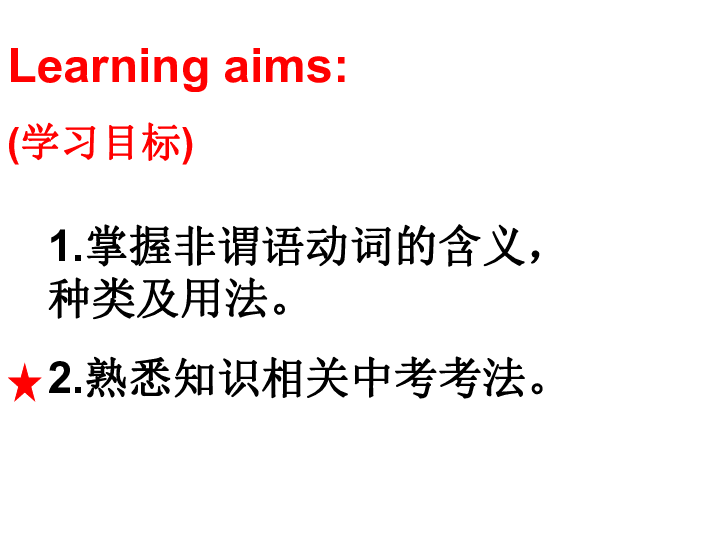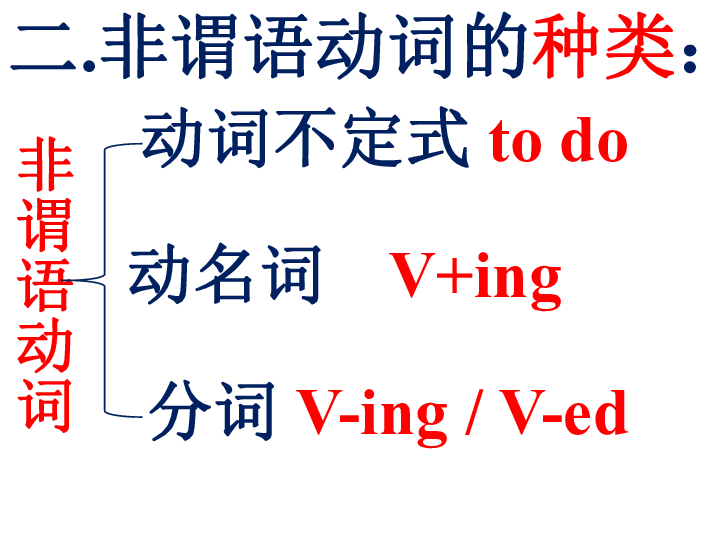中考专区二轮专题 词法---非谓语动词(动词不定式在家自主学习专题(共51张PPT))
文档属性
| 名称 | 中考专区二轮专题 词法---非谓语动词(动词不定式在家自主学习专题(共51张PPT)) |  | |
| 格式 | zip | ||
| 文件大小 | 166.5KB | ||
| 资源类型 | 教案 | ||
| 版本资源 | 外研版 | ||
| 科目 | 英语 | ||
| 更新时间 | 2020-03-09 19:07:13 | ||
图片预览





文档简介
(共51张PPT)
《非谓语动词》
null
Learning aims:
(学习目标)
1.掌握非谓语动词的含义,种类及用法。
2.熟悉知识相关中考考法。
一.非谓语动词的含义:
在句子中不做谓语成分的动词
就叫做非谓语动词。
e.g.1. I know a boy called Tom.
2. I ask Betty to rewrite her homework.
谓语动词
非谓语动词
谓语动词
非谓语动词
二.非谓语动词的种类:
非谓语动词
动词不定式 to do
动名词 V+ing
分词 V-ing / V-ed
动词不定式是非谓语动词的一种,它没有人称和数的变化,在句子中不能独立作谓语,但它仍保持动词的特点,即可以有自己的宾语和状语。
定义
(一)动词不定式
三.非谓语动词的用法:
肯定: to + V.原 或者 (to)+ V.原
否定:not/never + (to) + V.原
He likes to read novels.
I saw him come.
We decided not to buy that house.
4) It is interesting to fly a kite.
5) Please let him not go there.
null
构成
动词不定式
动词不定式
1.做主语,表语 To see is to believe.
2.做宾语 He likes to play.
3.做宾补 He asked me to go.
4.做定语 I have a lot to do.
5.做状语 I’m here to meet you.
6.疑问词+to+do I don’t know how to
do it.
用法
动词不定式
作主语
To hear your voice is so nice.
To study hard is very important.
不定式作主语时,通常用it作形式主语,
把真正的主语放在后面。
注意:
1、It is +adj. for/ of sb. to do sth.
null
作主语
To hear your voice is so nice.
To study hard is very important.
It is so nice to hear your voice.
It is very important to study hard.
不定式作主语时,通常用it作形式主语,
把真正的主语放在后面。
注意:
1、It is +adj. for/ of sb. to do sth.
null
It +be + adj. +for/of sb. to do sth.
for: adj.多为描述不定式行为的特征 (important/ necessary / interesting 等.)
of: adj. 多为 描述人的品质特征 (kind / nice / friendly / wise / foolish 等.)
作主语
It is easy _______ her to learn English well.
It is clever ________ you to solve the problem.
null
It +be + adj. +for/of sb. to do sth.
for: adj.多为描述不定式行为的特征 (important/ necessary / interesting 等.)
of: adj. 多为 描述人的品质特征 (kind / nice / friendly / wise / foolish 等.)
作主语
It is easy _______ her to learn English well.
It is clever ________ you to solve the problem.
of
for
null
2、It takes sb. some time to do sth.
作主语
我每天花去三个小时完成家庭作业。
null
2、It takes sb. some time to do sth.
It takes me three hours to finish the homework every day.
作主语
我每天花去三个小时完成家庭作业。(spend)
null
2、It takes sb. some time to do sth.
作主语
我每天花去三个小时完成家庭作业。
(spend)
null
2、It takes sb. some time to do sth.
It takes me three hours to finish the homework every day.
作主语
我每天花去三个小时完成家庭作业。(spend)
I spend three hours finishing the homework every day.
null
3、It is + n. (for sb) to do sth.
It is my pleasure to help you with your English.
作主语
null
4、用在谚语中
To see is to believe.
To say is easy, but to do is hard.
作主语
null
1、It is necessary ______us to learn to wait.
(of/for)
2、It was careless ______me to break the cup .
(of/for)
3、It took them 1,000 yuan _________this
table. (buy)
4、It is my pleasure _________ the box for you.
(carry)
练习
null
1、It is necessary ______us to learn to wait.
(of/for)
2、It was careless ______me to break the cup .
(of/for)
3、It took them 1,000 yuan _________this
table. (buy)
4、It is my pleasure _________ the box for you.
(carry)
to buy
for
of
to carry
练习
null
5、轮到我们打扫教室了。
It is our turn_________________________
6、To waste time is to shorten life. (翻译成中文)
练习
null
5、轮到我们打扫教室了。
It is our turn_________________________
6、To waste time is to shorten life. (翻译成中文)
to clean the classroom.
浪费时间就是缩短生命。
练习
null
1、主语 + be + to do sth
主语多为 duty / wish / hope / idea / plan / dream / work / job 等 名词
1、My dream is to be a singer.
2、His work is to clean the classroom every day.
作表语
我的梦想是成为一名歌手。
他的工作是每天清扫教室。
null
1、主语 + be + to do sth
主语多为 duty / wish / hope / idea / plan / dream / work / job 等 名词
作表语
我的梦想是成为一名歌手。
他的工作是每天清扫教室。
null
2、谚语中
1、To know everything is to know nothing.
2、To see is to believe.(眼见为实)
null
1、动词+ to do sth.
常用动词有:
want / wish / like / would like / hope / plan / try / decide / learn / need / agree / begin / start / forget / remember / seem / fail/ manage/ promise等
1、I hope to finish it tomorrow .
2、She plans to go and teach in the country.
作宾语
null
2、动词+疑问词+to do
I don’t know____________ next.
She can’t decide_________________.
作宾语
2、她不能决定买哪本书。
1、我不知道接下来该做什么。
what to do
which book to buy
=She can’t decide which book she should buy.
null
1、Don’t forget _________________.(关灯)
2、I happened ________when he called me. (出去)
3、I don’t want________________. (依赖别人)
4、Sam is learning________________. (怎样开车)
5、We promise __________ the environment.(保护)
练习
null
1、Don’t forget _________________.(关灯)
2、I happened ________when he called me. (出去)
3、I don’t want________________. (依赖别人)
4、Sam is learning________________. (怎样开车)
5、We promise __________ the environment.(保护)
to turn off the light
to go out
to depend on others
how to drive a car
练习
to protect
null
1、动词 + 宾语(sb./sth.) + to do sth.
1、The teacher asked her to answer the question.
2、The doctor told me to have a good rest.
作宾补-对宾语进行补充说明
常用动词有:ask, tell, allow, want 等
null
动词多为感官动词、使动词。
一感:feel
二听:hear, listen to
三使:make, let, have
四看:see, notice, watch, look at
John’s mother makes him play the piano every day.
被动:
John _________ play the piano every day.
is made to
2、动词+宾语+不带to的不定式
null
1、Let him _______ the work at once.
(finish / to finish)
2、Do you like listening to other people______?
(talk / talking/to talk )
3、Jim was seen _________the room.
(enter /to enter )
4、Please tell her _________here on time .
(come / to come)
练习
null
1、Let him _______ the work at once.
(finish / to finish)
2、Do you like listening to other people______?
(talk / talking/to talk )
3、Jim was seen _________the room.
(enter /to enter )
4、Please tell her _________here on time .
(come / to come)
finish
talk
to enter
to come
练习
null
5、I’ll help you _________this problem.
(to solve /solve )
6、 I wish you will stay with us.(改成简单句)
7、Her story made us laugh. (改成被动句)
null
5、I’ll help you _________this problem.
(to solve /solve )
6、 I wish you will stay with us.(改成简单句)
7、Her story made us laugh. (改成被动句)
(to ) solve
I wish you to stay with us.
We were made to laugh by her story.
null
放在被修饰词的后面
I have a lot of work to do.
I want to find something to drink.
作定语
不定式为不及物动词时后面应有必要的介词。
位置:
null
I’m looking for a hotel _________.
A. stay B. stay at C. to stay D. to stay at
He hasn’t got a house to live_____.
I have no pens to write _______.
1、原因状语:
主语 + be + adj.(表情感) + to do sth.
(happy/ glad angry / sorry / sad /afraid 等)
I’m sorry to hear that.
作状语
I’m glad to see you.
null
2、目的状语
(Come、go、stop….)+to do sth
The soldier ran into the room to save the girl .
We must stop to have a rest
null
3、结果状语
too + adj./adv. +to do sth.
adj./adv. enough to do sth.
You are too young to do this job.
He ran fast enough to catch the bus.
null
非谓语动词的用法:
二、动名词(主动,经常性)
1.动名词相当于一个名词,作主语时,谓语动词用单数。
Reading in bed is bad for your eyes.
It’s no use/ good doing sth.
2.有些动词或动词短语后面,只能接动名词作宾语。
完成实践值得忙 (finish,practise,be worth,be busy)
继续习惯别放弃(keep on, be used to, give up)
考虑建议不禁想(consider, suggest, can’t help)
喜欢思念要介意(enjoy , miss, mind)
形式主语
真正主语
3.动名词作表语可以和主语互换位置。
Your task is cleaning the windows.
Cleaning the windows is your task.
4.动名词作定语强调中心名词的用途。
a waiting room
a washing machine
a reading room
非谓语动词的用法:
三.现在分词(doing)强调主动,进行,经常性)
1.现在分词常放在see, hear ,watch ,
notice 等之后作宾补。
I saw the boy playing in the street just now .
2.现在分词作定语常放在被修饰词之前,现在分词短语要放在被修饰词的后面,相当于一个定语从句。
A sleeping baby = a baby who is sleeping .
Did you know the man talking to Mr Li?
=Did you know the man who was talking to Mr Li?
3.现在分词表伴随情况
He came into the classroom ,carrying
a book.
Saying these words, he threw the big out of the window.
Compared with Tom, Lucy has more books.
Did you know the man talking to Mr Li?
=Did you know the man who was talking to Mr Li?
3.现在分词表伴随情况
He came into the classroom ,carrying
a book.
Saying these words, he threw the big out of the window.
Compared with Tom, Lucy has more books.
非谓语动词的用法:
四.过去分词(done)(强调被动,完成性)
1.作宾补
have /get +sth +done 表示请别人干某事或使某物被做.
I had my TV repaired last night .
2.作定语
单一的过去分词作定语,要放在被修饰词的前面,过去分词短语作定语要放在被修饰词的后面,相当于一个定语从句。
a broken cup fallen leaves
He promised?______his old friend during his stay in Tianjin.
A. see????????????B. seeing??????????????C. saw????????????????D. to see
2.The children decide____their school yard this Friday afternoon.
A. clean?????????B. to clean?????????C. cleaning??????????D. cleaned
3.I found a letter ______ on the floor when I came into the classroom.
A. lying????????????B. lay????????????C. lie?????????????D. lies
4.Many old men prefer _______ in a peaceful countryside.
A. to live?????B. living?????C. live??????D lived
5.—Would you mind ______ in the dining hall?—Of course not.
A. not to smoke??????B. not smoking??????C. smoke???????????D. not smoke
达标测试 (一)
达标测试 (二)
1.I want to feel the happiness ______(bring) by my children.
2.It is no need for you _____(go) to school tomorrow.
3.He had his hair_______(cut) before the Spring Festival.
4.Would you please raise your voice ____
(make)us hear you clearly?
5.I like watching chat shows, because there are some famous people_____(talk)about their lives on these shows.
Exercises:
1. -- You’ve done very well this time.
-- It’s really kind ________.
A. for you to say so B. for you saying so
C. of you to say so D. of you saying so
2. It is better to lose one’s life than _______.
A. if you lose your spirit
B. losing his spirit
C. to lose one’s spirit
D. your spirit getting lost
Homework
3. – I can’t work in this way.
-- Why not _______ it in some other way?
A. try to do B. try doing
C. trying to do D. trying doing
4. Since you find it difficult _______ a decision, you’d better a discussion( 讨论) with your parents.
A. reach; have B. reaching; have
C. reach; having D. to reach; have
5. My father hates(痛恨) _______. He never allows me _______.
A. to smoke; to smoke
B. smoking; smoking
C. smoke; smoking
D. smoking; to smoke
6. The girl was beginning _______.
A. get angry B. to get angry
C. getting angry D. angry
7. There isn’t any difference between the two. I really don’t know ________.
A. where to choose B. which to choose
C. what to choose D. to choose which
8. The bag is too heavy for me _______.
A. to carry it B. not to carry it
C. to carry D. not to carry
9. The teacher will teach him _______.
A. to use B. use it
C. how to use it D. uses
找出句子中的不定式,并说出作用:
It takes you ten minutes to get there.
I hope to see him soon.
His wish is to become an artist.
People eat to live, but not live to eat.
I have a lot to tell you.
It’s not right to be always thinking of oneself.
We often see him play football.
《非谓语动词》
null
Learning aims:
(学习目标)
1.掌握非谓语动词的含义,种类及用法。
2.熟悉知识相关中考考法。
一.非谓语动词的含义:
在句子中不做谓语成分的动词
就叫做非谓语动词。
e.g.1. I know a boy called Tom.
2. I ask Betty to rewrite her homework.
谓语动词
非谓语动词
谓语动词
非谓语动词
二.非谓语动词的种类:
非谓语动词
动词不定式 to do
动名词 V+ing
分词 V-ing / V-ed
动词不定式是非谓语动词的一种,它没有人称和数的变化,在句子中不能独立作谓语,但它仍保持动词的特点,即可以有自己的宾语和状语。
定义
(一)动词不定式
三.非谓语动词的用法:
肯定: to + V.原 或者 (to)+ V.原
否定:not/never + (to) + V.原
He likes to read novels.
I saw him come.
We decided not to buy that house.
4) It is interesting to fly a kite.
5) Please let him not go there.
null
构成
动词不定式
动词不定式
1.做主语,表语 To see is to believe.
2.做宾语 He likes to play.
3.做宾补 He asked me to go.
4.做定语 I have a lot to do.
5.做状语 I’m here to meet you.
6.疑问词+to+do I don’t know how to
do it.
用法
动词不定式
作主语
To hear your voice is so nice.
To study hard is very important.
不定式作主语时,通常用it作形式主语,
把真正的主语放在后面。
注意:
1、It is +adj. for/ of sb. to do sth.
null
作主语
To hear your voice is so nice.
To study hard is very important.
It is so nice to hear your voice.
It is very important to study hard.
不定式作主语时,通常用it作形式主语,
把真正的主语放在后面。
注意:
1、It is +adj. for/ of sb. to do sth.
null
It +be + adj. +for/of sb. to do sth.
for: adj.多为描述不定式行为的特征 (important/ necessary / interesting 等.)
of: adj. 多为 描述人的品质特征 (kind / nice / friendly / wise / foolish 等.)
作主语
It is easy _______ her to learn English well.
It is clever ________ you to solve the problem.
null
It +be + adj. +for/of sb. to do sth.
for: adj.多为描述不定式行为的特征 (important/ necessary / interesting 等.)
of: adj. 多为 描述人的品质特征 (kind / nice / friendly / wise / foolish 等.)
作主语
It is easy _______ her to learn English well.
It is clever ________ you to solve the problem.
of
for
null
2、It takes sb. some time to do sth.
作主语
我每天花去三个小时完成家庭作业。
null
2、It takes sb. some time to do sth.
It takes me three hours to finish the homework every day.
作主语
我每天花去三个小时完成家庭作业。(spend)
null
2、It takes sb. some time to do sth.
作主语
我每天花去三个小时完成家庭作业。
(spend)
null
2、It takes sb. some time to do sth.
It takes me three hours to finish the homework every day.
作主语
我每天花去三个小时完成家庭作业。(spend)
I spend three hours finishing the homework every day.
null
3、It is + n. (for sb) to do sth.
It is my pleasure to help you with your English.
作主语
null
4、用在谚语中
To see is to believe.
To say is easy, but to do is hard.
作主语
null
1、It is necessary ______us to learn to wait.
(of/for)
2、It was careless ______me to break the cup .
(of/for)
3、It took them 1,000 yuan _________this
table. (buy)
4、It is my pleasure _________ the box for you.
(carry)
练习
null
1、It is necessary ______us to learn to wait.
(of/for)
2、It was careless ______me to break the cup .
(of/for)
3、It took them 1,000 yuan _________this
table. (buy)
4、It is my pleasure _________ the box for you.
(carry)
to buy
for
of
to carry
练习
null
5、轮到我们打扫教室了。
It is our turn_________________________
6、To waste time is to shorten life. (翻译成中文)
练习
null
5、轮到我们打扫教室了。
It is our turn_________________________
6、To waste time is to shorten life. (翻译成中文)
to clean the classroom.
浪费时间就是缩短生命。
练习
null
1、主语 + be + to do sth
主语多为 duty / wish / hope / idea / plan / dream / work / job 等 名词
1、My dream is to be a singer.
2、His work is to clean the classroom every day.
作表语
我的梦想是成为一名歌手。
他的工作是每天清扫教室。
null
1、主语 + be + to do sth
主语多为 duty / wish / hope / idea / plan / dream / work / job 等 名词
作表语
我的梦想是成为一名歌手。
他的工作是每天清扫教室。
null
2、谚语中
1、To know everything is to know nothing.
2、To see is to believe.(眼见为实)
null
1、动词+ to do sth.
常用动词有:
want / wish / like / would like / hope / plan / try / decide / learn / need / agree / begin / start / forget / remember / seem / fail/ manage/ promise等
1、I hope to finish it tomorrow .
2、She plans to go and teach in the country.
作宾语
null
2、动词+疑问词+to do
I don’t know____________ next.
She can’t decide_________________.
作宾语
2、她不能决定买哪本书。
1、我不知道接下来该做什么。
what to do
which book to buy
=She can’t decide which book she should buy.
null
1、Don’t forget _________________.(关灯)
2、I happened ________when he called me. (出去)
3、I don’t want________________. (依赖别人)
4、Sam is learning________________. (怎样开车)
5、We promise __________ the environment.(保护)
练习
null
1、Don’t forget _________________.(关灯)
2、I happened ________when he called me. (出去)
3、I don’t want________________. (依赖别人)
4、Sam is learning________________. (怎样开车)
5、We promise __________ the environment.(保护)
to turn off the light
to go out
to depend on others
how to drive a car
练习
to protect
null
1、动词 + 宾语(sb./sth.) + to do sth.
1、The teacher asked her to answer the question.
2、The doctor told me to have a good rest.
作宾补-对宾语进行补充说明
常用动词有:ask, tell, allow, want 等
null
动词多为感官动词、使动词。
一感:feel
二听:hear, listen to
三使:make, let, have
四看:see, notice, watch, look at
John’s mother makes him play the piano every day.
被动:
John _________ play the piano every day.
is made to
2、动词+宾语+不带to的不定式
null
1、Let him _______ the work at once.
(finish / to finish)
2、Do you like listening to other people______?
(talk / talking/to talk )
3、Jim was seen _________the room.
(enter /to enter )
4、Please tell her _________here on time .
(come / to come)
练习
null
1、Let him _______ the work at once.
(finish / to finish)
2、Do you like listening to other people______?
(talk / talking/to talk )
3、Jim was seen _________the room.
(enter /to enter )
4、Please tell her _________here on time .
(come / to come)
finish
talk
to enter
to come
练习
null
5、I’ll help you _________this problem.
(to solve /solve )
6、 I wish you will stay with us.(改成简单句)
7、Her story made us laugh. (改成被动句)
null
5、I’ll help you _________this problem.
(to solve /solve )
6、 I wish you will stay with us.(改成简单句)
7、Her story made us laugh. (改成被动句)
(to ) solve
I wish you to stay with us.
We were made to laugh by her story.
null
放在被修饰词的后面
I have a lot of work to do.
I want to find something to drink.
作定语
不定式为不及物动词时后面应有必要的介词。
位置:
null
I’m looking for a hotel _________.
A. stay B. stay at C. to stay D. to stay at
He hasn’t got a house to live_____.
I have no pens to write _______.
1、原因状语:
主语 + be + adj.(表情感) + to do sth.
(happy/ glad angry / sorry / sad /afraid 等)
I’m sorry to hear that.
作状语
I’m glad to see you.
null
2、目的状语
(Come、go、stop….)+to do sth
The soldier ran into the room to save the girl .
We must stop to have a rest
null
3、结果状语
too + adj./adv. +to do sth.
adj./adv. enough to do sth.
You are too young to do this job.
He ran fast enough to catch the bus.
null
非谓语动词的用法:
二、动名词(主动,经常性)
1.动名词相当于一个名词,作主语时,谓语动词用单数。
Reading in bed is bad for your eyes.
It’s no use/ good doing sth.
2.有些动词或动词短语后面,只能接动名词作宾语。
完成实践值得忙 (finish,practise,be worth,be busy)
继续习惯别放弃(keep on, be used to, give up)
考虑建议不禁想(consider, suggest, can’t help)
喜欢思念要介意(enjoy , miss, mind)
形式主语
真正主语
3.动名词作表语可以和主语互换位置。
Your task is cleaning the windows.
Cleaning the windows is your task.
4.动名词作定语强调中心名词的用途。
a waiting room
a washing machine
a reading room
非谓语动词的用法:
三.现在分词(doing)强调主动,进行,经常性)
1.现在分词常放在see, hear ,watch ,
notice 等之后作宾补。
I saw the boy playing in the street just now .
2.现在分词作定语常放在被修饰词之前,现在分词短语要放在被修饰词的后面,相当于一个定语从句。
A sleeping baby = a baby who is sleeping .
Did you know the man talking to Mr Li?
=Did you know the man who was talking to Mr Li?
3.现在分词表伴随情况
He came into the classroom ,carrying
a book.
Saying these words, he threw the big out of the window.
Compared with Tom, Lucy has more books.
Did you know the man talking to Mr Li?
=Did you know the man who was talking to Mr Li?
3.现在分词表伴随情况
He came into the classroom ,carrying
a book.
Saying these words, he threw the big out of the window.
Compared with Tom, Lucy has more books.
非谓语动词的用法:
四.过去分词(done)(强调被动,完成性)
1.作宾补
have /get +sth +done 表示请别人干某事或使某物被做.
I had my TV repaired last night .
2.作定语
单一的过去分词作定语,要放在被修饰词的前面,过去分词短语作定语要放在被修饰词的后面,相当于一个定语从句。
a broken cup fallen leaves
He promised?______his old friend during his stay in Tianjin.
A. see????????????B. seeing??????????????C. saw????????????????D. to see
2.The children decide____their school yard this Friday afternoon.
A. clean?????????B. to clean?????????C. cleaning??????????D. cleaned
3.I found a letter ______ on the floor when I came into the classroom.
A. lying????????????B. lay????????????C. lie?????????????D. lies
4.Many old men prefer _______ in a peaceful countryside.
A. to live?????B. living?????C. live??????D lived
5.—Would you mind ______ in the dining hall?—Of course not.
A. not to smoke??????B. not smoking??????C. smoke???????????D. not smoke
达标测试 (一)
达标测试 (二)
1.I want to feel the happiness ______(bring) by my children.
2.It is no need for you _____(go) to school tomorrow.
3.He had his hair_______(cut) before the Spring Festival.
4.Would you please raise your voice ____
(make)us hear you clearly?
5.I like watching chat shows, because there are some famous people_____(talk)about their lives on these shows.
Exercises:
1. -- You’ve done very well this time.
-- It’s really kind ________.
A. for you to say so B. for you saying so
C. of you to say so D. of you saying so
2. It is better to lose one’s life than _______.
A. if you lose your spirit
B. losing his spirit
C. to lose one’s spirit
D. your spirit getting lost
Homework
3. – I can’t work in this way.
-- Why not _______ it in some other way?
A. try to do B. try doing
C. trying to do D. trying doing
4. Since you find it difficult _______ a decision, you’d better a discussion( 讨论) with your parents.
A. reach; have B. reaching; have
C. reach; having D. to reach; have
5. My father hates(痛恨) _______. He never allows me _______.
A. to smoke; to smoke
B. smoking; smoking
C. smoke; smoking
D. smoking; to smoke
6. The girl was beginning _______.
A. get angry B. to get angry
C. getting angry D. angry
7. There isn’t any difference between the two. I really don’t know ________.
A. where to choose B. which to choose
C. what to choose D. to choose which
8. The bag is too heavy for me _______.
A. to carry it B. not to carry it
C. to carry D. not to carry
9. The teacher will teach him _______.
A. to use B. use it
C. how to use it D. uses
找出句子中的不定式,并说出作用:
It takes you ten minutes to get there.
I hope to see him soon.
His wish is to become an artist.
People eat to live, but not live to eat.
I have a lot to tell you.
It’s not right to be always thinking of oneself.
We often see him play football.
同课章节目录
- 词法
- 名词
- 动词和动词短语
- 动词语态
- 动词时态
- 助动词和情态动词
- 非谓语动词
- 冠词
- 代词
- 数词和量词
- 形容词副词及其比较等级
- 介词和介词短语
- 连词和感叹词
- 构词法
- 相似、相近词比较
- 句法
- 陈述句
- 一般疑问句和否定疑问句
- 特殊疑问句及选择疑问句
- 反意疑问句
- 存在句(There be句型)
- 宾语从句
- 定语从句
- 状语从句
- 主谓一致问题
- 简单句
- 并列句
- 复合句
- 主谓一致
- 主、表语从句
- 名词性从句
- 直接引语和间接引语
- 虚拟语气
- 感叹句
- 强调句
- 倒装句
- 祈使句
- 句子的成分
- 句子的分类
- 题型专区
- 单项选择部分
- 易错题
- 完形填空
- 阅读理解
- 词汇练习
- 听说训练
- 句型转换
- 补全对话
- 短文改错
- 翻译
- 书面表达
- 任务型阅读
- 语法填空
- 其他资料
